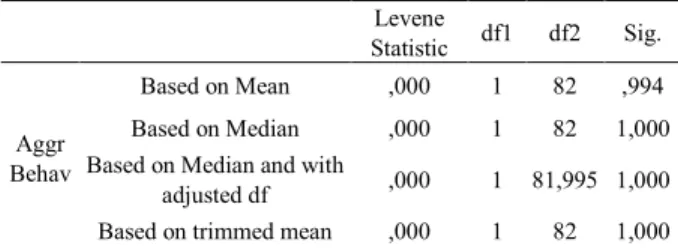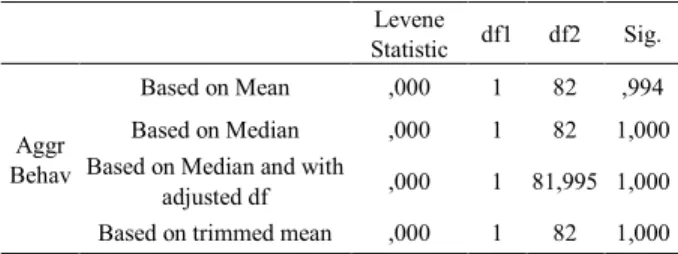The results of this study demonstrate that school counselors can use self-regulation of emotional modules to help students reduce aggressive behavior. The activities in the self-regulation phase of emotional training are focused on breathing (not focused on distractions), which indicates changes, namely (a) a decrease in the experience of negative emotions, (b) a decrease in amygdala activity, and (c) an increase in activity in the brain regions involved in spreading attention [36]. The seven most important components of self-regulation of the emotional modules can facilitate students to reduce aggressive behavior that is often performed.
The purpose of this study is to determine the effectiveness of self-regulation of emotion modules to reduce aggressive behavior.

Peer Review Report
About HRPUB
Manuscript Information
Evaluation Report
Horizon Research Publishing, USA (HRPUB) is a worldwide open access publisher serving the academic and scientific research communities by issuing peer-reviewed journals covering a wide range of academic disciplines. As an international academic organization for researchers and scientists, we aim to provide researchers, writers, academic professors and students with the most advanced research achievements in a wide range of fields and to facilitate academic exchange between them. Manuscript Title: Effectiveness of Self-Regulation of Emotion Modules to Reduce Student's Negative Aggressive Behavior.
This study examines the change in the level of aggressive behavior of groups of students who are given the self-regulation intervention of emotion modules and groups of students who are given conventional counseling interventions. Also, the process of the conventional counseling intervention should be described in this study. And whether the process of conventional counseling intervention involves any emotional regulation needs to be said.
4 In the results section, we encouraged the authors to report whether there are differences between two groups in four aspects of aggressive behavior.
Recommendation
- The self-regulation learning module is a critical independent variable of this study but limited information about the learning module was addressed in the literature review and method section
- The description of the research design and subject of the study was similar. Please eliminate duplicate information
- The results of the test of assumptions for the t-test could be moved to 2.5 data analysis so that the results section could be focused on the results of the t-test analysis
- The accuracy of the explanation of the t-test analysis should be reexamined to ensure the results and the following discussion are accurate
- Please describe the theoretical background of the module in the literature and provide more information about the structure, content, and procedure of using the module in the method section
- It would be helpful for the readers to better understand the results if the author provides more demographic information about the background of the participants (e.g., gender, grade/age, criteria
- Please consult statistic books to check the explanation of the t-test results to ensure the accuracy of the results
However, more should be done to improve the clarity of the literature and methods review section and the accuracy of the results section. The self-regulation learning module is the critical independent variable of this study, but limited information about the learning module was discussed in the literature review and methods section. The hypothesis test results for the t-test could be moved to Data Analysis 2.5 so that the results section could focus on the results of the t-test analysis.
The accuracy of the explanation of the t-test analysis should be re-examined to ensure that the results and the following discussion are accurate. Please describe the theoretical background of the module in the literature and provide more information about the structure, content and approach of using the module in the methods section. It would be helpful for readers to better understand the results if the author provides more demographic information about the participants' background (e.g. gender, grade/age, criteria demographic information about the participants' background (e.g. gender, grade/age) age, criteria for determining the high level of aggressive behavior).
In addition, the results of the manuscript could be enriched if the author performed further analysis (eg, t-test for gender or F test for class) of the data. Consult statistics books to check the interpretation of t-test results to ensure the accuracy of the results.
Effectiveness of Self-Regulation of Emotion Modules to Reduce Negative Aggressive Behavior of Student
Wahyu Nanda Eka Saputra 1 , Said Alhadi 1 , Amien Wahyudi 1 , Agus Supriyanto 1 , Siti Muyana 1
- Introduction
- Method
- Research design
- Data collection
- Subject of study
- Research stages
- Data analysis technique
- Results
- Discussion
- Conclusions
Seventh, conduct posttests and analysis of research data to determine the effectiveness of self-regulation of emotions to reduce aggressive behavior. One way to reduce aggressive behavior is to help students learn to optimize the self-regulation of emotions. Activities in the self-regulation of the emotion training phase are focused on breathing (not focused on distractions), and thus show changes, namely (a) reducing the experience of negative emotions, (b) reducing amygdala activity and (c) increasing activity in the brain involved in attentional spread [36].
In this study, tutors facilitate students in learning to optimize the self-regulation of emotions by using modules. Modules used to help students develop self-regulation of emotions to reduce aggressive behavior categorized as appropriate for use by counselors [21]. The seven main components of self-regulation of emotion modules can facilitate students to reduce aggressive behavior that occurs.
In this study, self-regulation of emotions also did not involve students' independence in learning. Other studies have concluded that self-regulation of emotion strategies can be used by counselors to effectively reduce aggressive behavior [39]. Whereas in this study ranked as experimental research, which aims to test the effectiveness of self-regulation of emotion modules to reduce aggressive behavior.

Acknowledgements
In this study, the emphasis was on the aspect of student independence in education because the self-regulation of emotion can be developed with the help of modules. In this study, however, the identified aggressive behaviors focused on aspects of physical and relational aggressiveness. In contrast, in this study aggressive behavior was recognized with more specific forms, namely physical, verbal, anger and hostility.
Other studies also concluded that emotion regulation influences aggressive behavior that arises as a result of provocation by others [40]. However, this research cannot be classified as correlational research, and there is no attempt to identify the effect of specific strategies implemented by counselors to reduce aggressive behavior. In this study, the identified aggressive behavior was also limited to aggressive behavior in the face of provocation or reactive aggressive behavior, while in this study, the aggressive behavior that can be in the form of reactive or proactive.
Aggressive behavior that can be minimized can suppress the emergence of negative perceptions of school climate among students. School counselors can make various efforts to suppress the appearance of aggressive behavior, among others using the help of the emotion self-regulation module [21], implementing a peace counseling approach [42] and informational counseling focused on solution [43] . In this research, it has been found that one of the counseling techniques that uses emotion self-regulation modules can be used to help students.
So emotional regulation strategies can still be debated whether children at this age used emotional regulation strategies. A limitation of this study is the research design that uses a quasi-experimental design, and the two groups are not randomly divided as true experimental design research. Counselors help counselors develop self-regulation of emotions by involving seven main components, namely receiving, evaluating, triggering, seeking, formulating, implementing, and assessing.
This research should be a reference for counselors in using the self-regulation of emotional modules to help the guidance and counseling program in building a culture of peace in the school environment. Caropreso, “The Death Instinct and the Psychic Dimension Beyond the Pleasure Principle in the Works of Spielrein and Freud,” Int. Sütterlin, “Towards a Cognitive Agility Index: The Role of Metacognition in Human Computer Interaction,” in International Conference on Human-Computer Interaction, 2017, vol.
Gross, “Effects of Mindfulness-Based Stress Reduction (MBSR) on Emotion Regulation in Social Anxiety Disorder.” Adiputra, “The Effect of Students' Perception of Negative School Climate on Students' Poor Academic Performance in Indonesia,” Int. Saputra et al., “Peace Counseling Approach (PCA) to Reduce Negative Aggressive Behavior of Students,” Univers.
Effectiveness of Self-regulation of Emotion Modules to Reduce Negative Aggressive Behavior of Students
- Research Design
- Data Collection
- Subject of Study
- Research Stages
- Data Analysis Technique
In this study, the supervisor trains the ability to self-regulate emotions using modules. These studies provide a basis for strengthening testing of emotion module regulation to reduce aggressive behavior. The results of the study concluded that self-regulation modules can effectively help students reduce aggressive behavior.
Other literature also mentions that self-regulation of emotions is an alternative strategy for counselors to reduce aggressive behavior [34]. Activities in the emotion self-regulation training phase focus on breathing (not focusing on distractions), thus showing changes, namely (a) reduction in the experience of negative emotions, (b) reduction in amygdala activity, and (c) increased of brain activity involved in the distribution of attention [36]. Modules used to help students develop emotion self-regulation to reduce aggressive behavior categorized as suitable for use by counselors [21].
However, in this study, emotion self-regulation was used to improve students' adjustment, while this study can reduce aggressive behavior. While this study is classified as experimental research, the purpose of which is to test the effectiveness of self-regulation of emotional modules to reduce aggressive behavior. In this research, it was found that one of the counseling techniques that uses the self-regulation of emotional modules can be used to help students reduce aggressive behavior.

Acknowledgments
The main components of the module consist of six elements, namely receiving, evaluating, triggering, searching, formulating, implementing and assessing [21]. In this research process, students train in emotional self-regulation skills that have been explained in detail in the module, leading to a directive method where students need to be more active in applying emotional self-regulation skills. This research is supported by other studies which conclude that emotion-related self-regulation can help students improve students' adjustment in the school environment [38].
In this study, the emphasis was on the aspect of students' independence in education, because the self-regulation of emotions can be developed with the help of modules. However, in this study, the aggressive behavior identified focused on aspects of physically and relationally aggressive behavior. Also in this study, the identified aggressive behavior was limited to aggressive behavior in the presence of provocation or reactive aggressive behavior, while in this study the aggressive behavior could be in the form of reactive or proactive behavior.
Alex Linley et al., "Character strengths in the United Kingdom [4]: The VIA Inventory of Strengths," Pers. Caropreso, “The death instinct and the mental dimension [11] beyond the pleasure principle in the works of Spielrein and Freud,” Int. Muyana, “Self-regulation of emotion module to reduce aggressive behavior,” Advances in Social Science, Education and Humanities Research, vol.







